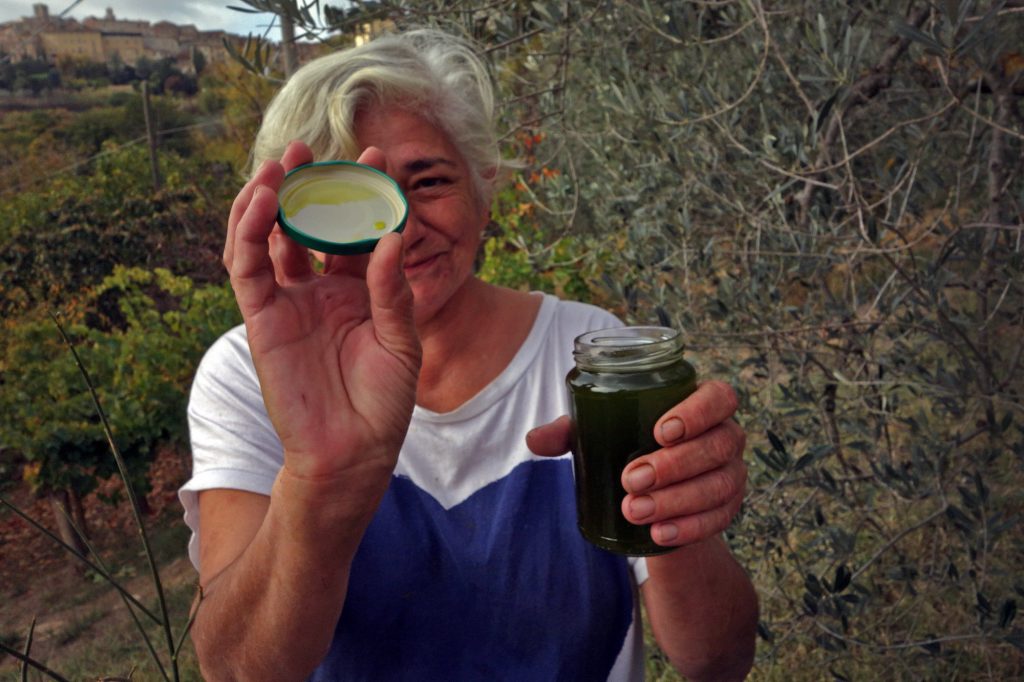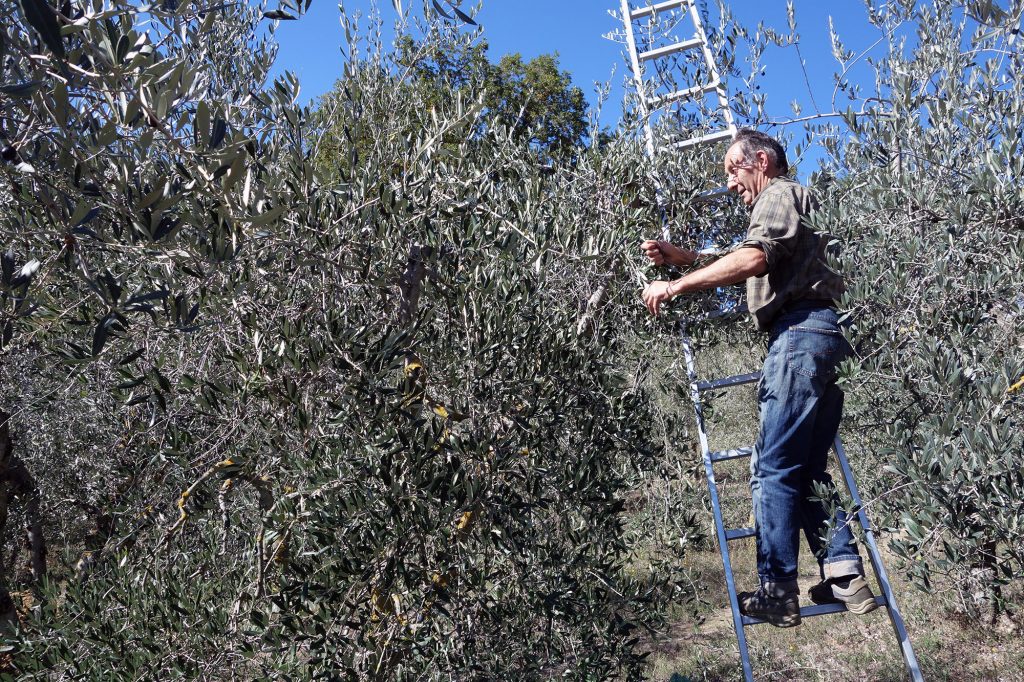
Second only to the fine wines of Tuscany, the olive and the rich golden oil derived from the black or green fruit (and maybe not even second – not if you are an olive grove farmer or a connoisseur of finest stuff – the extra virgin olive oil that can set you back a paycheck)… THIS is the reason to be in Italy in the autumn.
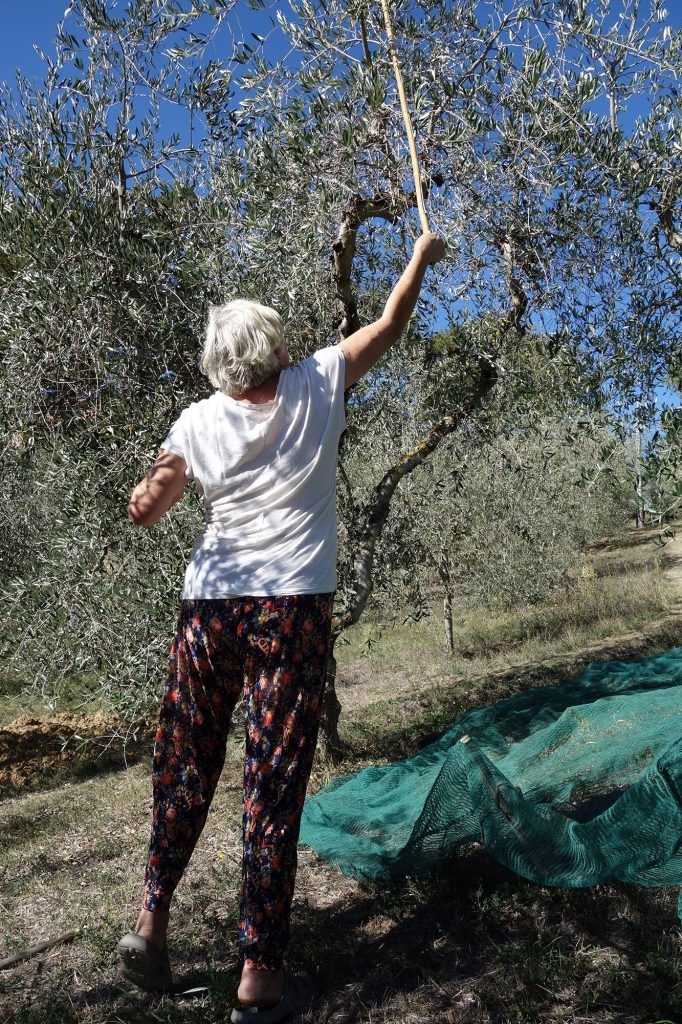
The throngs of summer tourists have gone home; the grapes have been harvested. Now in late October comes the time of the olive harvest.
And what a spectacle it is.
Around our little 14th century walled village of Montepulciano, the whitish-blue-green olive groves blanket the steep hills; the gnarled trees bend and grope for the Tuscan sun like a troupe of modern dancers in freeze frame, each tree (each dancer) striking a different distinct pose.
Each day this time of year the olive farmers, even the old men, mount their ladders, shaking the branches with manual or electric olive rakes, so the olives fall into the waiting nets on the ground below. I even saw one old lady standing beneath an olive tree, reaching as high as she could go, beating the branches with a green umbrella. (Yes, I failed to get that photo.)
As luck would have it, our rented farmhouse nestles not more than 30 feet from that of the hard-working farm couple, Claudio and Violeterria. So it’s been an education to watch them out in the olive grove each day, working their way across the hillside, tree by tree. Claudio spends days laboriously hand-picking his crop, while Violeterria shakes the branches with a home-made olive rake fashioned out of a bamboo pole with a child’s toy rake affixed to the end.
And just up the hill and within clear ear-shot of our little villa, the local “frantioio,” the olive oil mill, just fired up late this week, emitting sounds like a living thing — growling churning, crushing, humming, thrumming with activity — as local farmers haul in their olives for processing. At this time of year, that olive mill goes wide open, late into the night.
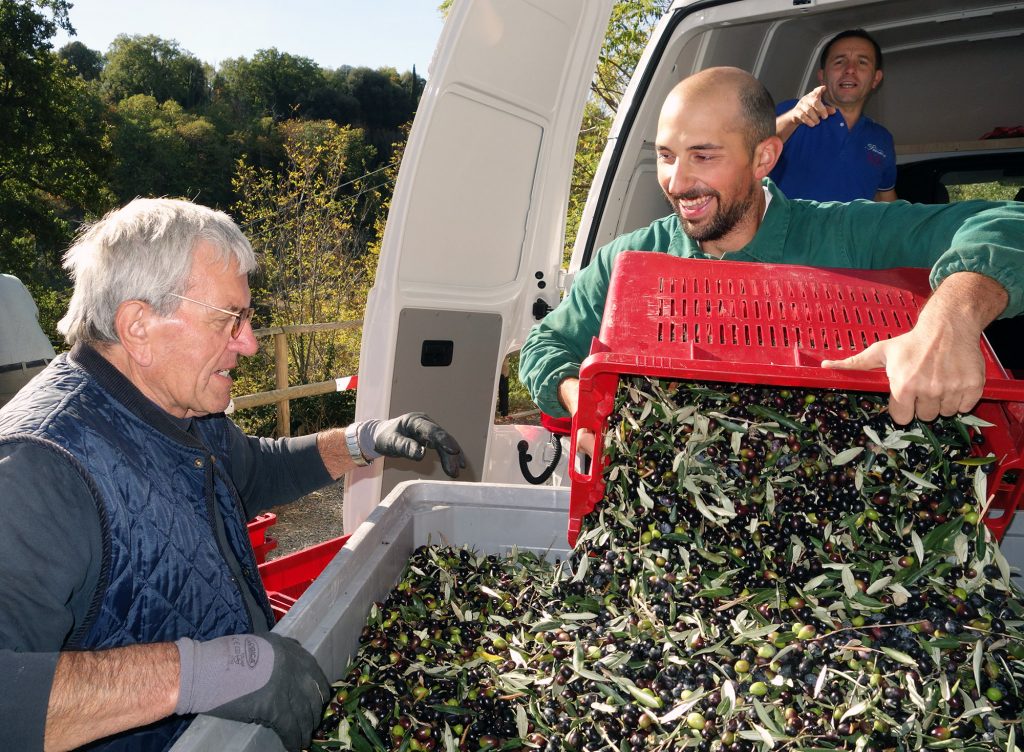
INTO THE FRAY
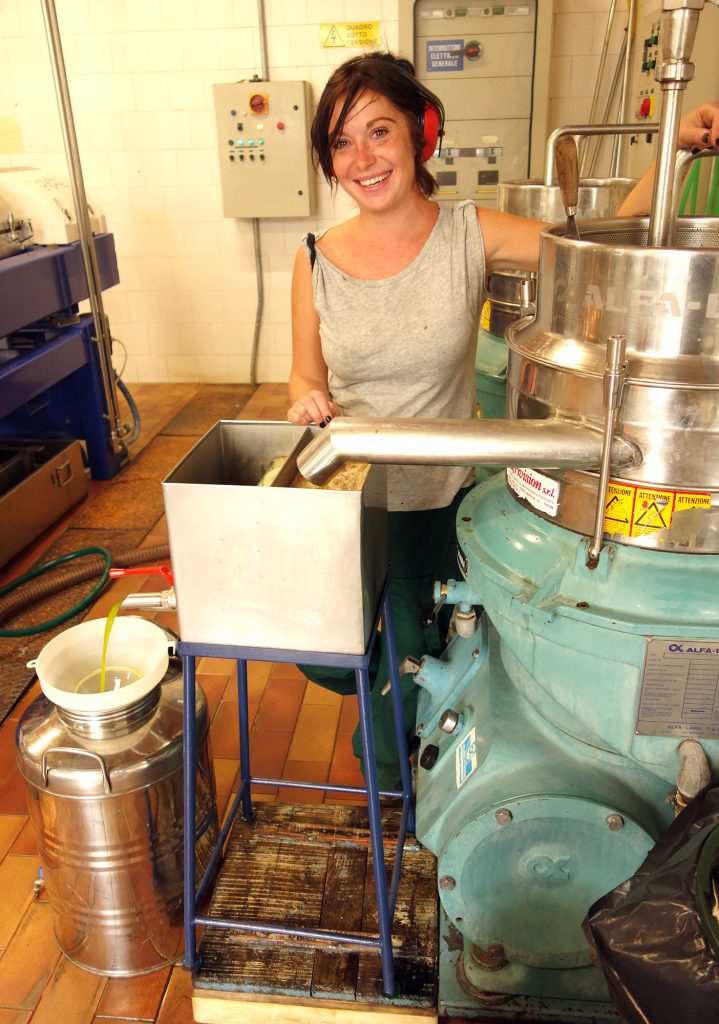
This morning I managed to get into the olive mill, just by hanging around the back door until it seemed ok…so I just smiled and took photos discreetly, but without sneaking. Up close and in person, the olive mill hummed with machinery and life: intense workers attended to the glistening stainless steel oil extractors mounted on red tile floors glistening and slick with the residue of the olive oil, while olive farmers — fine looking gray-haired men, stout, swarthy, built low to the ground and most appearing to be at least 60 — went about the business of getting their oil in big plastic or steel vats of at least 20 gallons and taking two beefy men to hoist into the back of the three-wheeled scooter trucks so popular over here.
By the way, no one here at the mill appeared to speak English, so I did a lot of hand-waving, pointing, gesturing and smiling. It seemed to work, for the mill workers and farmers smiled back and left me alone to observe.
Now, the smell of the working mill deserves its own paragraph.
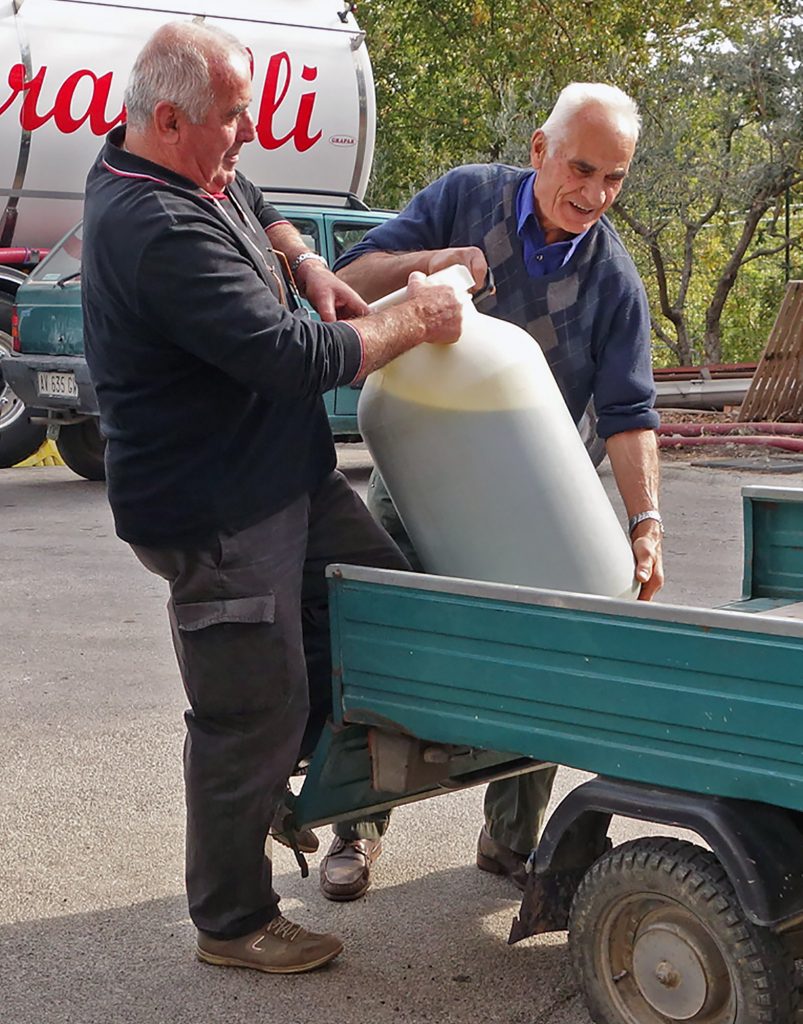
Since I can’t photograph smell, I’ll have to rely on mere words, and this will fall way short of the olfactory blitz of a real working olive mill. And “smell” is the wrong word anyway – more like aroma, essence or even perfume. Try this: a mélange of sweet, rich, oily, nutty, tangy, zesty, gusto — a scent unlike any I’ve ever experienced, so intense it caused me to want to sneeze, and so robust it deserves an exclamation point. There!
And maybe the Italians themselves could describe the aroma. Turning to the olive association’s official brochure, I read, “the fragrance has a light aroma of artichoke, almonds, light fruit and freshly cut grass…” Leave it to the Italians to introduce the poetry of “freshly cut grass.”
Now, in addition to the aroma and the engines of the mill roaring busily, add the happy melodic chatter of the Italian farmers and factory workers; it’s downright musical. No wonder the Italians invented music notation and opera! Their language rifts, lifts, soars and makes little arpeggios in normal daily conversation. Now imagine them all talking (singing?) at once over the roar and hum of the live mill…allegro vivace!
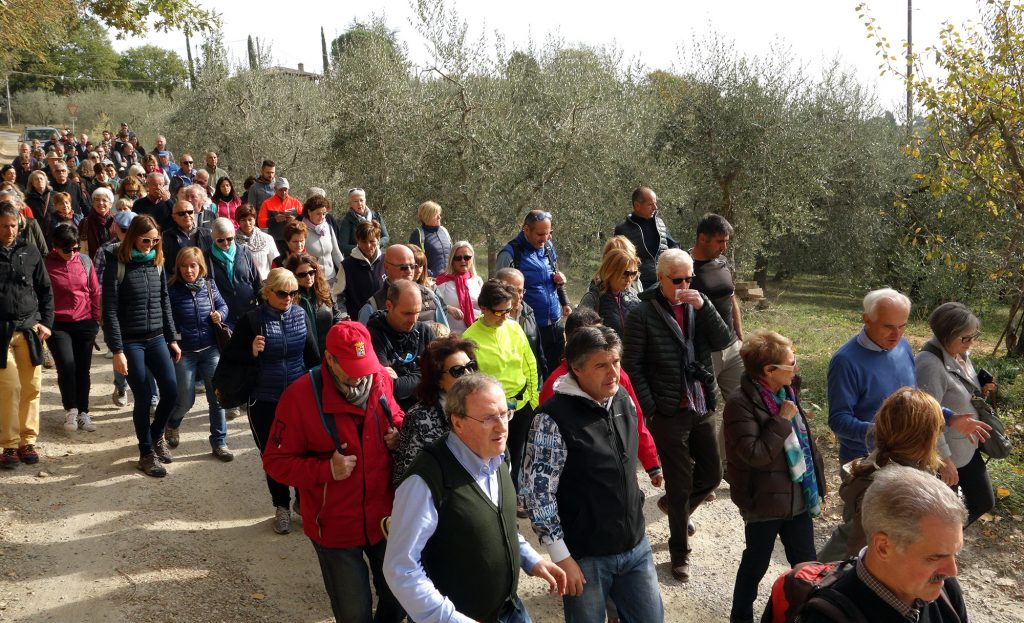
A Walk Among the Olive Trees
To celebrate the olive harvest this year, folks in Montepulciano organized an Olive Festival, which kicked off this morning with a brisk 5k hike through the olive groves surrounded the hill town.
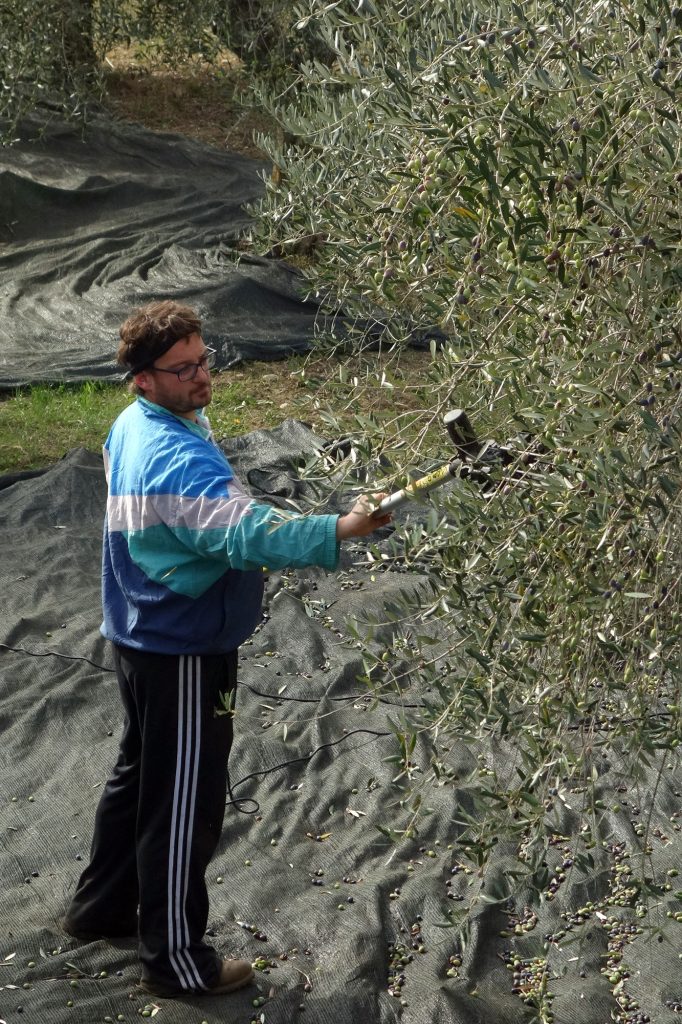
It began at the olive mill, with about 100 townspeople and a handful of foreigners gathering to tour the mill, before heading out into the dusty rural gravel roads surrounding the walled city for a Camminata Tra Gli Olivi, “a walk among the olive trees.”
I shouldn’t call it a hike. More like a pilgrimage, a haj, a walk of reverence among the ancient olive groves that have helped sustain generations of family farms in this region. Listen to the quote from the olive coop brochure:
“The unique value of the extra virgin olive oil produced (here) arises from various factors relating to both where the olives are grown, and the people who cultivate them. The area is particularly suitable for olive cultivation, the gently rolling hills and the altitude of between 300 and 650 meters…allow for the continuous fresh breeze that makes the air healthy and clean, and that allows farmers to avoid the use of chemical products.
“Most of the work carried out by the farmers…is undertaken by their own families, so has been the tradition for centuries…It is the result of a happy combination of age-old peasant wisdom and the latest technology. The particular character of olive cultivation in this area is linked directly to the existence of the many small producers who personally cultivate their own olives groves, and follow the harvest from the tree to the olive mill.”
One begins to get the notion that olive farming, like the tending the vineyards, is not so much an occupation or a job as it is a sacred calling, a way of life.
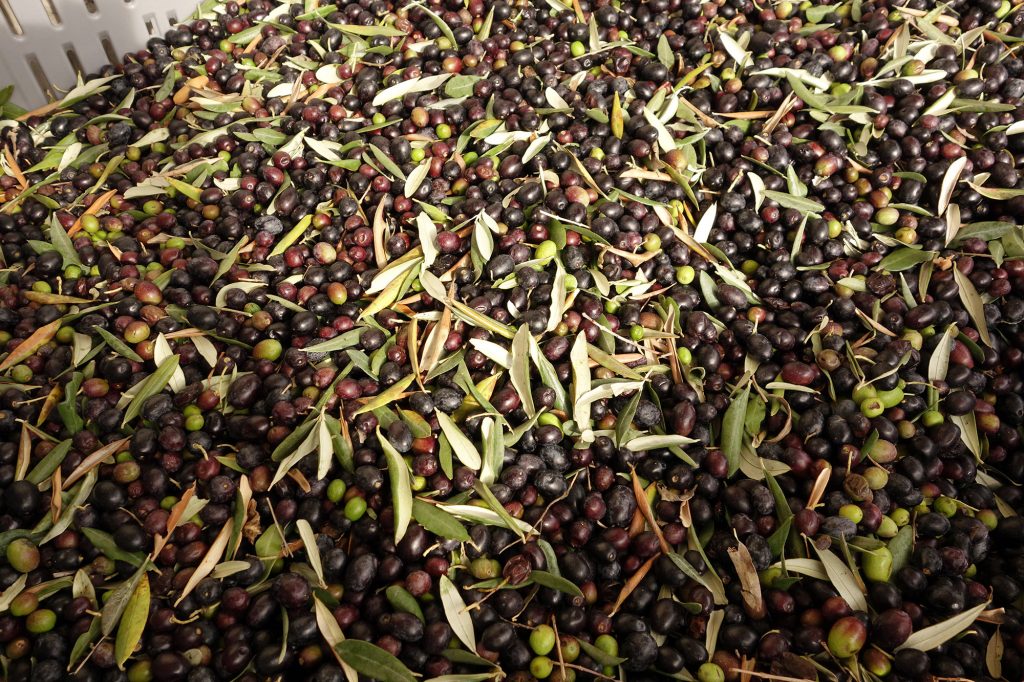
We are joined by a delightful English chap, Andrew, a tall, 60-something ex-pat who calls Montepulciano “Monty-P,” and who works from his rented apartment as a techie.
Having lived here for five years, Andrew was well-versed in the region’s agricultural lifestyle, explaining, “It’s a fine dance with nature,” he explains. “First the grapes are harvested, then the olives…and it has to happen before the first frost, because when that happens, it’s all over.”
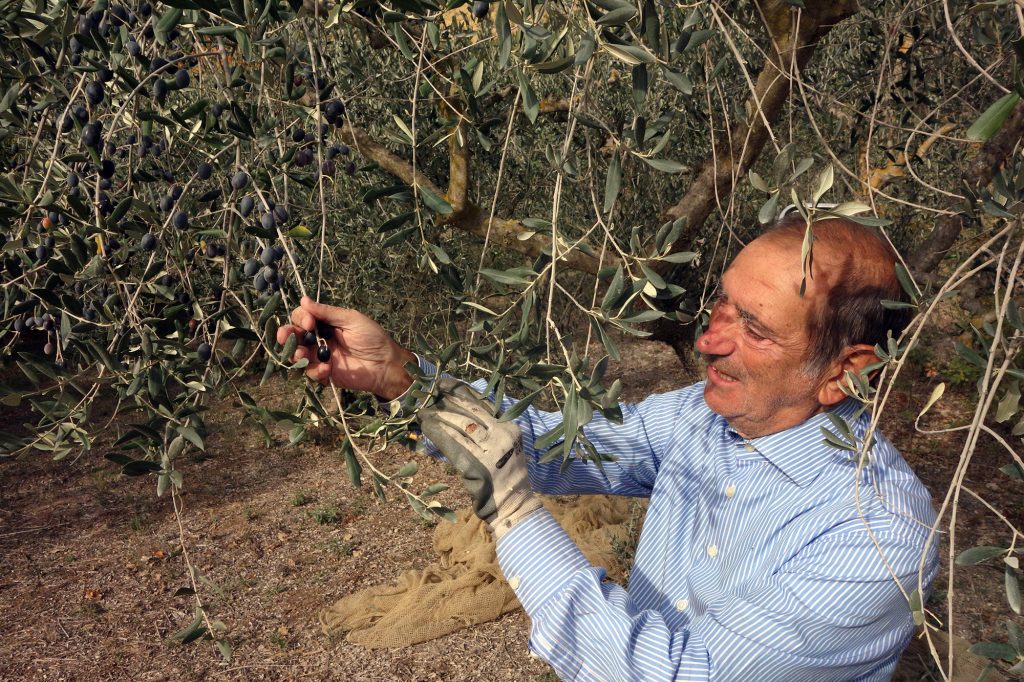
For two hours, the chatty troupe of walkers, some with baby strollers and family dogs, wander the backroads through the olive groves, taking photos of the ripening fruit, watching and talking with local olive farmers working in the groves before that first frost predicted for next week.
Back home at La Casina Toscana, I take off my dusty boots and try to write about the day. Suddenly, a figure appears at the green mesh fence separating our villa from the olive grove of Claudio and Violeterria.
And it is she, the farm wife, standing there, waving me over. In her right hand she holds a simple, unmarked green jar full of olio nuovo “new oil,” by that we mean really new. Pressed at the mill up the hill just three days ago from olives from these very trees.
Violeterria wants me to smell the open jar of rich golden goodness. A perfect ending to a celebration of the harvest and of the age-old lifestyle here.
